Vaping ruins kids' lives. Ohio shops that sell to them face almost zero oversight
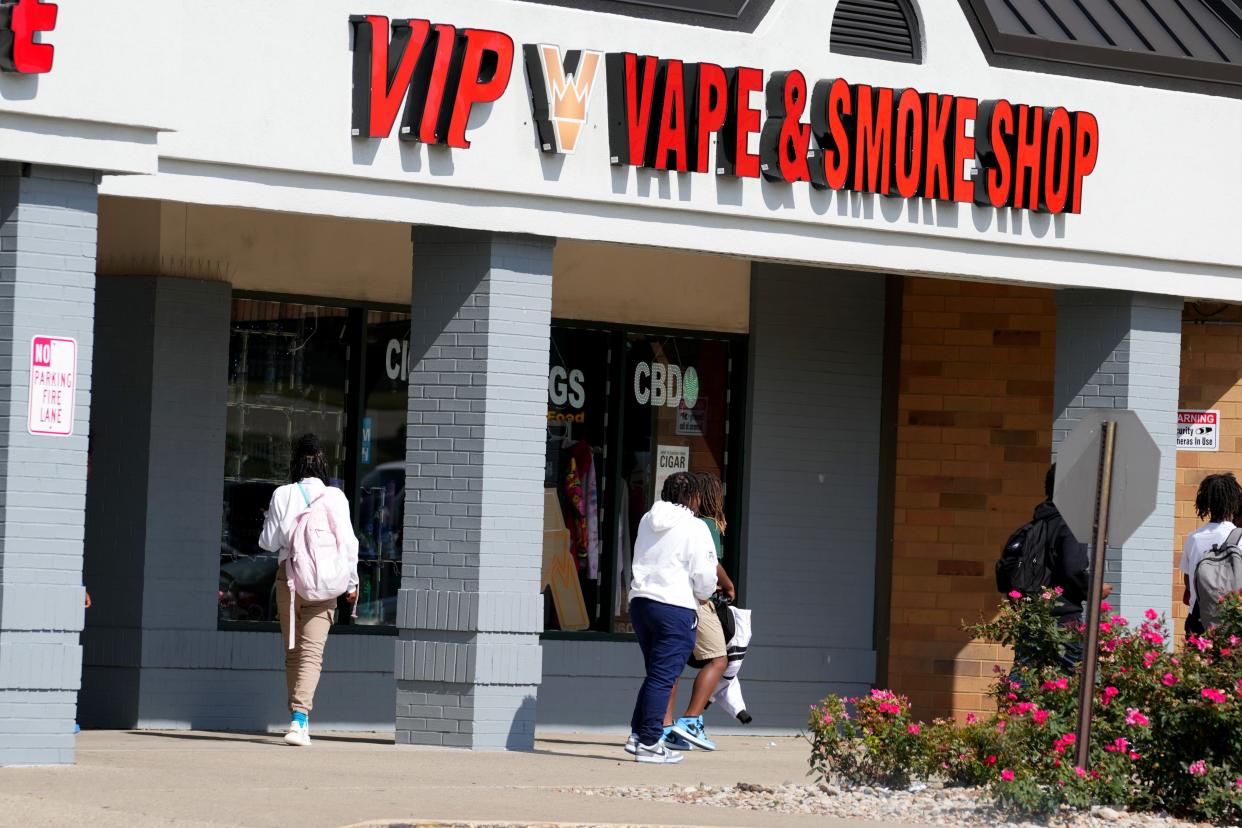
When a 16-year-old girl went into the VIP Wireless & Smoke Shop on Beechmont Avenue in January, she walked out a short time later with a vape pen, an electronic device that heats liquid containing flavoring and nicotine.
A Hamilton County Sheriff’s deputy observed the exchange and when he confronted the teen, she said she traded in a non-working vape pen for a working one, and it wasn’t her first time buying tobacco products there, according to a police report and court records.
The clerk who gave her the vape was cited for selling to minors, though the misdemeanor charge against him was eventually dismissed. VIP Distribution Discount Inc., which operates the Beechmont Avenue store, did not respond to messages from The Enquirer.
What police say happened at the Anderson Township smoke shop is far from an unusual story.
Teens and young adults working with the U.S. Food and Drug Administration bought tobacco products in 328 instances at 300 different stores in southwest Ohio and Northern Kentucky since January 2019, according to an Enquirer analysis of federal-level inspection data.
Of those violations, 67 involved electronic smoking devices such as vapes or e-cigarettes, the most popular tobacco products among school-aged children.
The Enquirer also found that the majority, or 59%, of stores cited by the feds during the last four years are located within 1 mile of a middle or high school.
Those numbers do not capture the full extent of illegal sales of tobacco products to minors by legitimate retailers, nor do they include online retailers, but they do reveal how widespread the problem is.
Sales to underage buyers happened at stores across Hamilton, Butler, Warren and Clermont counties in Ohio, and Boone, Campbell and Kenton counties in Kentucky.
To put it in perspective, the number of cited stores is more than triple the number of Skyline Chili restaurants in Greater Cincinnati.
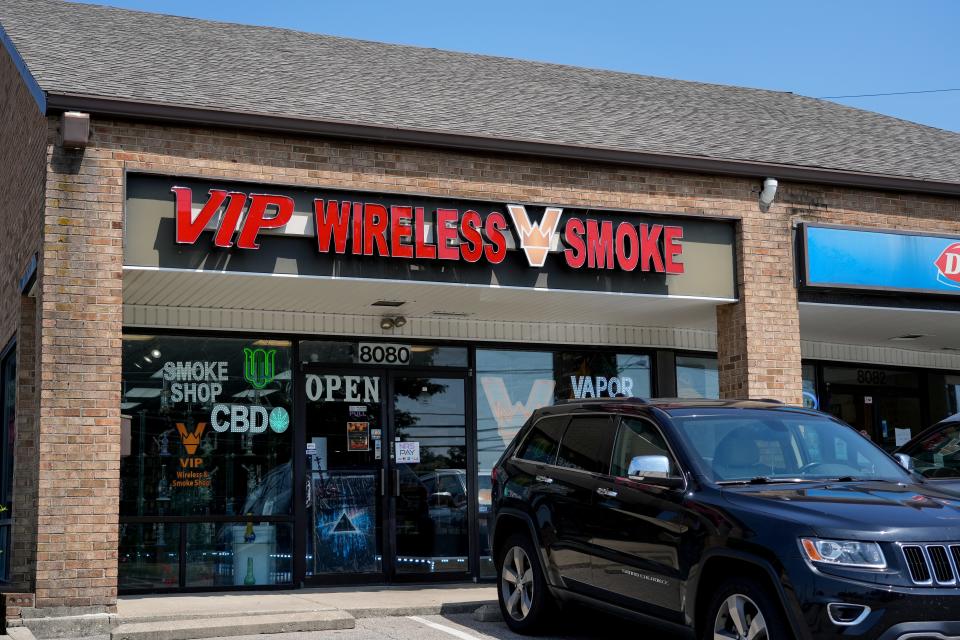
Teens and children who smoke most commonly get hold of tobacco products from someone in their social circle, but it’s not rare for them to buy such items from clerks at gas stations, vape shops and even mainstream store chains like Kroger or United Dairy Farmers.
As many as 43% of 15 to 20-year-old e-cigarette users buy their devices from retail stores, research shows, with a 2019 study revealing school-aged vape users prefer smoke shops and convenience stores over other retailers.
[ The Enquirer is making this special report on the youth vaping crisis free as a public service. Support local journalism with a subscription. ]
Consumers in Ohio and Kentucky must be 21 to buy tobacco products, including vapes and e-cigarettes, under state law. The federal legal smoking age was raised to 21 in 2019.
State agencies also inspect stores for compliance. In Ohio, where selling tobacco products to minors results in a criminal citation, officials don't track whether fines have been paid, instead leaving that job to local courts.
Enquirer special report: Vaping crisis takes toll on children's health, families, schools
How are state laws for over-the-counter tobacco sales enforced?
Local police departments have the authority to issue citations for illegal tobacco sales, but much of the enforcement of tobacco laws is left to state agencies, which respond to complaints and hire teens and young adults to make undercover buys.
The Ohio Investigative Unit − contracted by the state’s departments of health and mental health and addiction services − carries out these sting operations year-round, as does the Kentucky Department of Alcoholic Beverage Control, which conducts around 6,000 buy attempts each year, many on behalf of the FDA.
Passing these compliance checks should be a breeze, said Commander Eric Wolf, a spokesperson for the Ohio Investigative Unit.
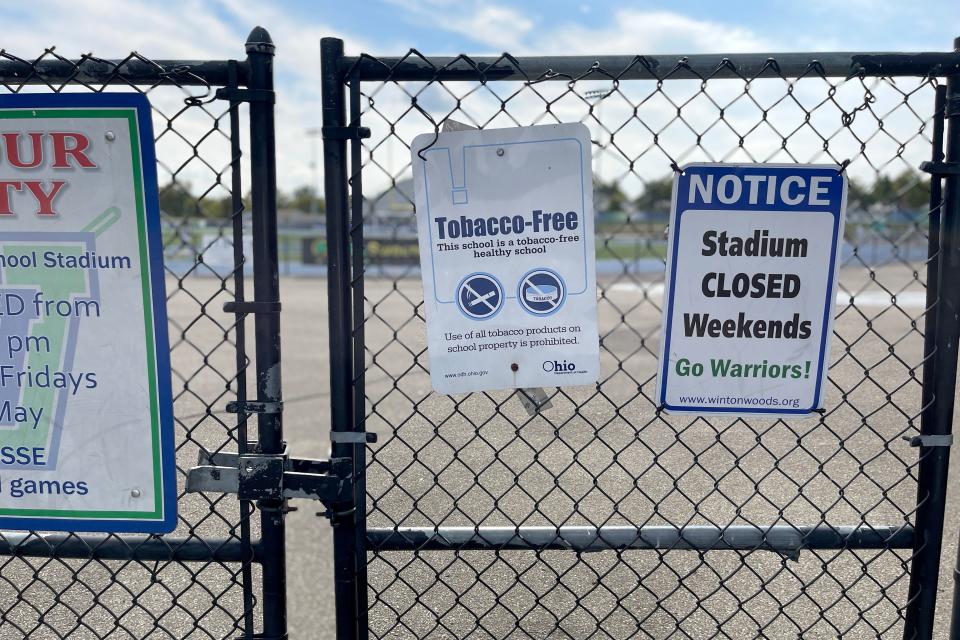
Wolf said the agency typically employs 16 to 20-year-olds, many of whom are interested in a career in law enforcement.
They aren't allowed to appear older than they are, meaning they have to wear everyday clothes and cannot have facial hair or makeup, Wolf said. They’re also required to show an ID and give their true age when asked.
Similar rules apply to underage buyers in Kentucky, who are even encouraged to wear clothes bearing their high school insignia.
“The biggest point of these compliance checks is to make sure that the retailers are checking IDs for these youthful appearing individuals,” Wolf said. “We’re not trying to do anything to trick or entrap these retailers.”
But the problem is bigger than clerks simply neglecting to check IDs, Wolf said, noting incidents at stores where clerks have the ability to scan IDs and deliberately override the register’s warning that the buyer is underage.
Wolf said there’s also been a recent emphasis on having underage buyers specifically ask for vapes and e-cigarettes, versus traditional tobacco products, given their rise in popularity among teens and young adults.
As of early August, OIU had attempted 59 e-cigarette purchases this year with 12 sold, according to the agency's data. Those attempts were among the more than 1,400 stings carried out by that point this year at stores across the state.
To get a more realistic picture of illegal sales to minors, however, underage buyers at both the state and federal levels should look older and be able to lie to store clerks, said Dr. Rob Crane, president of the Preventing Tobacco Addiction Foundation.
Why? Because that’s what someone trying to buy a vape illegally would do, Crane said.
He said the reason for raising the legal smoking age to 21 was to cut off access to the young adults who supply school-aged kids with vapes and other forms of tobacco.
“That’s the person we’re trying to stop is that person who is buying a lot of vapes, who has a beard, or piercings, or tattoos, and they’re being sold to,” he added.
‘Little incentive’ for retailers to follow federal law
Retailers cited by the FDA for selling tobacco products to minors are usually slapped with fines and, in some cases, suspensions of their ability to sell tobacco.
A first offense is punishable by a warning letter, with increasing civil fines levied for repeat offenses. The highest possible fine totals nearly $13,000 and is issued if a store has six violations within a four-year period.
Retailers with five or more violations within three years are hit with a no-tobacco-sale order prohibiting all tobacco product sales, usually for up to 30 days. But such penalties are rare.
Only 61 no-tobacco-sale orders have been issued nationwide since January 2019, FDA data show. One of those was to the Monroe IGA Express, which was cited for six violations in less than two years.
Inspections by the FDA in fiscal year 2022 covered less than a quarter of tobacco retailers nationwide. Critics say those inspections are usually clustered in cities and stores that do get inspected typically don’t get a follow-up inspection for at least a year.
“As a result, those retailers that are not in compliance appear to have little incentive to prevent the sale of tobacco products to minors or to ensure they are keeping illegal products that are attractive to youth off the shelves,” Sen. Tim Kaine, a Virginia Democrat, and Senate Minority Leader Mitch McConnell, a Kentucky Republican, wrote in a July letter to the agency’s commissioner.
What are vapes? What's in them? Everything you need to know about e-cigarettes
Are fines just the ‘cost of doing business’?
Punishments for illegal tobacco sales differ slightly at the state level.
Selling tobacco products to minors in Ohio is a misdemeanor punishable by up to 30 days in jail and a $250 fine for a first offense. A repeat offense carries a 60-day jail term and a $500 fine.
While it's possible under state law for retailers to receive fines up to $2,000 or $3,000, depending on how many times they've been caught selling to minors, officials say it's usually the person behind the cash register who's held responsible.
Kentucky issues civil fines reaching as high as $1,000 for clerks and $2,500 for retailers.
There are no penalties in either state for underage possession or use of tobacco products.
As of Sept. 1, the Kentucky Public Protection Cabinet recorded a total of $61,300 in unpaid fines related to the illegal sale of tobacco products to minors.
Spokespeople for the Ohio Department of Health and the Ohio Department of Mental Health and Addiction Services said their agencies don’t collect data on whether fines have been paid, nor do they follow up on the outcome of cases stemming from the state's sting operations.
"Citations issued by (the Ohio Department of Public Safety) are handled through local courts, so there is no way for us to know the outcomes or keep track of fines paid," Eric Wandersleben, with the Ohio Department of Mental Health and Addiction Services, said in an email.
Wolf said OIU does check on whether clerks slapped with criminal citations are ultimately convicted, but the agency leaves it to the courts to keep track of unpaid fines.
Even if those fines are being paid, it might not matter much in the end.
Monetary penalties are an inadequate form of deterrence given that the average convenience store does hundreds of thousands of dollars in tobacco sales each year, said Crane, a physician and retired professor of family medicine at the Ohio State University.
“It’s the cost of doing business,” he said. “The only thing that works is if you have on the second or third offense, a suspension. You suspend them for a week or two weeks, all of a sudden, they'll stop selling to kids.”
Ohio Rep. Sara Carruthers, a Hamilton Republican, introduced legislation in August aimed at increasing fine amounts for repeat illegal sales and possibly shutting down stores caught selling vapes and other tobacco products to minors, similar to how the state’s alcohol sales law is enforced.
Expanded state authority is even favored by some working in the vaping industry, including Jeff Kathman, owner of Cincy Vapors.
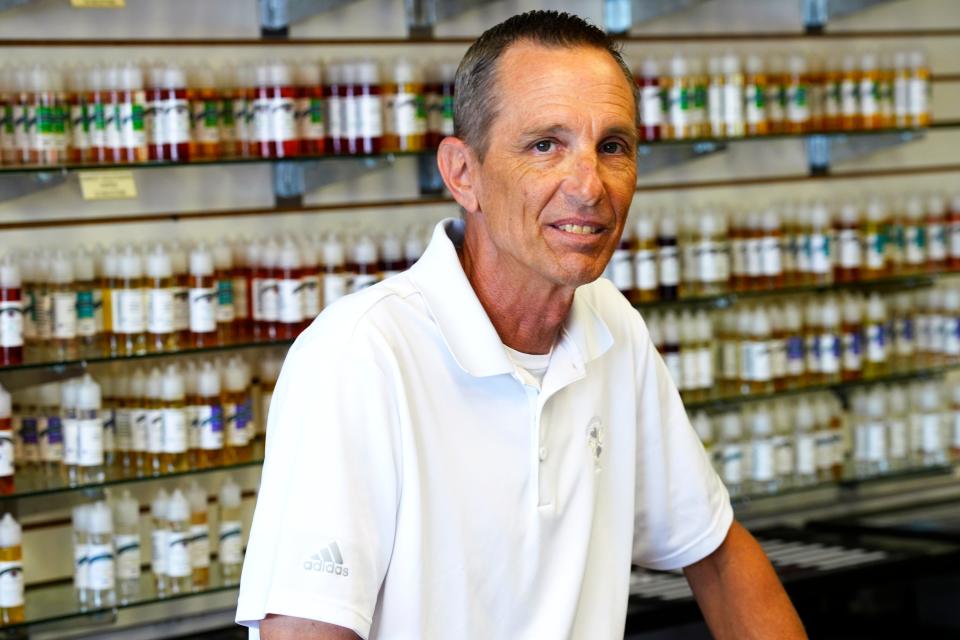
"There has to be something, we have to be able to close this big loophole because I don't see it getting any better," said Kathman, who is proud of the fact his stores have not been cited.
While illegal sales are a problem happening at large franchises and small businesses, Kathman squares no small amount of blame on the recent rise of "hybrid" smoke shops, which carry every kind of tobacco and vaping product imaginable. Some of these stores prefer to pay whatever fines are levied against them for illegal sales because those pale in comparison to the money coming in, he said.
"Their business thrives off catching the sales to the minors and being able to operate off of that," Kathman said, noting that often these stores are able to sell at cheaper prices, too.
New Cincy Vapors employees are made to card everyone at first, though the standard practice is to card anyone who appears under 27 years old, and there's a zero-tolerance policy for selling to minors, meaning any employee caught doing so will lose their job, said Kathman, who sits on the board of the Ohio Vapor Trade Association.
While Cincy Vapors does sell flavored vape products, which are also appealing to adults trying to quit traditional tobacco, the business doesn't carry products that are otherwise appealing to kids. Kathman said he knows of some places dealing in vapes decorated with popular cartoon characters.
Enforcement complicated by online sales
Brick-and-mortar stores are just one part of the problem, however, because internet tobacco sales have also become a common way for middle and high schoolers to obtain vapes, with as many as 13% of school-aged smokers reporting they buy tobacco products online.
There are limits on the shipping of tobacco products and the FDA does conduct surveillance of online marketing, but there's currently no enforcement strategy comparable to its inspection of in-person stores.
If the FDA investigates an online store and finds evidence of illegal sales to minors, that retailer will likewise be issued a warning letter followed by escalating civil fines or a no-tobacco-sale order. However, a December 2022 report by the Office of Inspector General found the FDA issued 899 warning letters to online retailers between 2010 and 2020 but issued no fines or other enforcement actions.
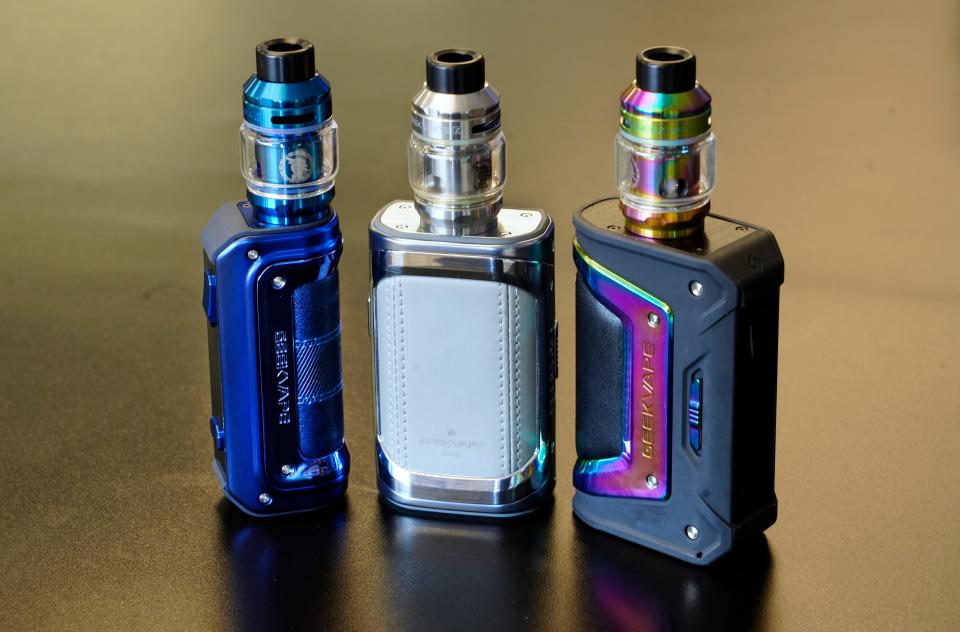
Since enforcing tobacco sales laws online is more expensive and complicated than in brick-and-mortar stores, a complete ban on tobacco sales online, either federally or at the state level, likely would be the most effective approach in preventing sales to minors, according to a report by the Mitchell Hamline School of Law.
"Issue No. 2, of course, is that we have to stop online sales," Crane said. "There's no reason that you should be able to sell a deadly product online."
From the editor: Why The Enquirer spent 6 months investigating teen vaping
Are there better ways of enforcement?
Enforcement of tobacco laws would be easier if retailers were required to obtain a tobacco retail license, said Page Dobbs, an associate professor of public health at the University of Arkansas. Licensing, she said, allows authorities to better track tobacco sellers and revoke their ability to sell tobacco after repeat violations.
Ohio and Kentucky do not have tobacco retail license laws, but major cities including Cincinnati, Columbus and Louisville have in recent years adopted their own. Locally, the cities of Norwood, Hamilton and Middletown also have tobacco retail license laws.
Crane said the Preventing Tobacco Addiction Foundation has applied for a $900,000 federal grant to implement tobacco retail licensing across Ohio.
Cincinnati’s tobacco retail licensing ordinance went into effect in late 2019 and requires business owners selling tobacco products to obtain a license for every property and vending machine they operate.
Last year, the Cincinnati Health Department made 144 underage buy attempts, with 16 instances in which someone under 21 was able to purchase tobacco. In 2021, the city conducted 289 buy attempts, with tobacco sold to an underage buyer in 128 cases.
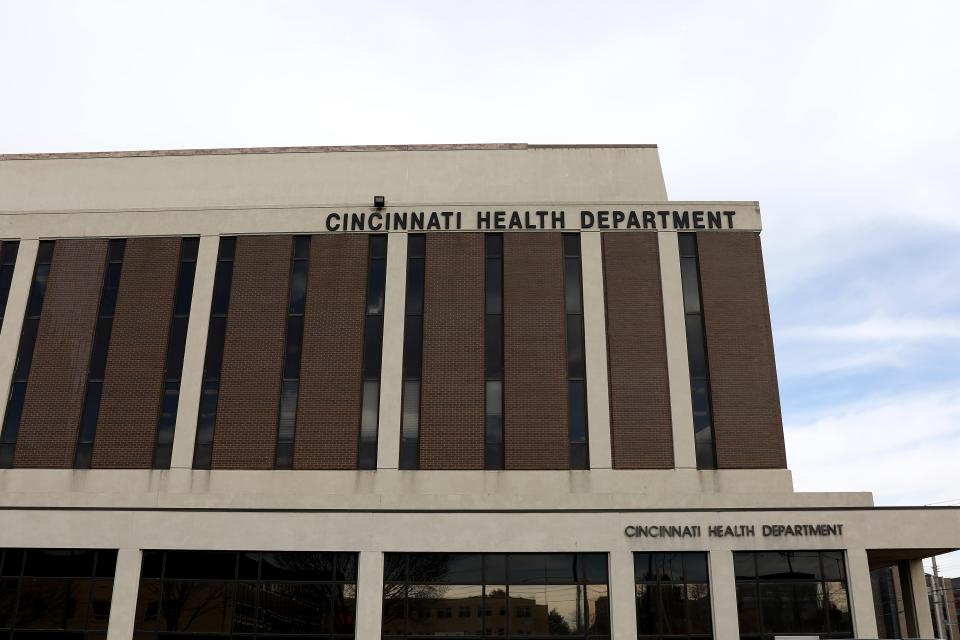
Sting operations are conducted at every licensed tobacco retailer in the city at least once every two years, Jose Marques, a department spokesperson, said in an email. Penalties for selling to minors under the city’s ordinance include fines, which are used to fund enforcement and license revocation.
Another strategy is to create a limit for the number of licenses issued per capita so that when a tobacco retail license is revoked, the retailer doesn’t get it back, Dobbs said.
“It puts an extra level of pressure on retailers to own their responsibility and compliance, and to take it seriously when the law is passed,” she added.
While experts say local health departments are in a better position to enforce tobacco sales laws because they can tailor policies to the needs of their communities, enforcement of Cincinnati’s tobacco retail licensing has already faced pitfalls.
No underage buys were attempted in 2020, the first year they were due to happen, because of COVID-19-related restrictions, Marques said. Last year, staffing constraints and reduced availability of underage buyers stymied the city’s enforcement efforts, leading to a lower overall number of buy attempts.
When told of Cincinnati's difficulties in enforcing its licensing law, Crane said: “We are going to be focusing on watching the watchers because there’s always going to be challenges. But if you don’t keep an eye on them, then bad things will happen.”
Read all the stories in this special report here.
This project was underwritten, in part, by Interact for Health. Underwriters do not determine, change or restrict content.

This article originally appeared on Cincinnati Enquirer: Vapes ruin kids' lives. So why do stores keep selling to teens?

